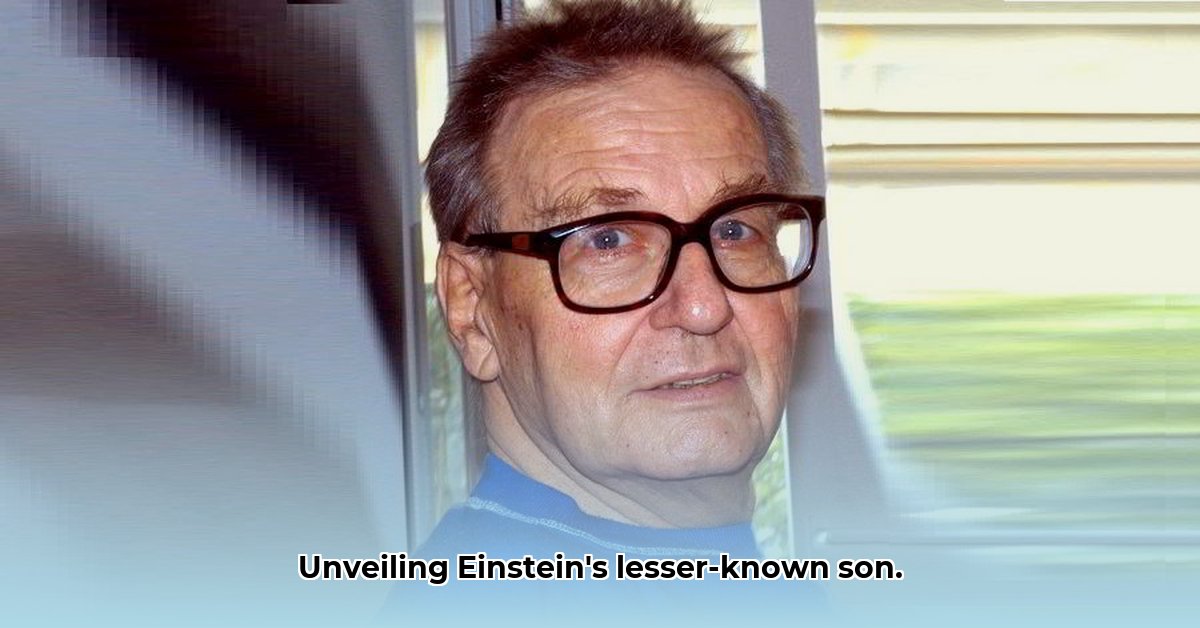You’ve heard of Albert Einstein, the genius. But did you know about his grandson, Bernhard Caesar Einstein? More than just a famous relative, Bernhard carved his own path as an accomplished engineer and inventor. This article explores his life, innovations in light amplification and laser technology, and the unique identity he forged amidst a towering family legacy. We will examine his professional achievements, consider the interplay of his heritage, and analyze the lasting impact of his work. This is not just about familial connection; it’s a story of individual achievement and innovation. For more information on memorials dedicated to Bernhard, visit Bernhard’s Memorials.
Engineering Innovator and Grandson of a Legend
Bernhard Caesar Einstein, grandson of Albert Einstein, led a life distinguished by his own accomplishments. While he carried a famous name, Bernhard independently established himself in engineering, contributing significantly to his field while building a family. This is the narrative of a man who emerged from his grandfather’s shadow to make his own mark. How did his engineering endeavors set him apart?
A Life Forged Through Innovation
Bernhard was a skilled engineer with an innovative mind, driven to excel beyond his family’s legacy. His professional journey reflected his technical expertise and passion, highlighting the complex relationship between inherited opportunities and personal ambition. While the influence of his family background remains a subject of consideration, his achievements stand as a testament to his abilities and dedication.
Contributions to Technology and Laser Advancements
Bernhard’s career centered on engineering, specifically the advancement of electron tubes and laser technology, demonstrating his technical skills. Holding patents in the United States and Switzerland, he contributed to companies such as Texas Instruments, Litton Industries, and the Swiss Army Research Lab. His contributions spanned diverse areas, revealing his passion for practical applications.
Family and Personal Life
Bernhard maintained a relatively private life, especially when compared to his grandfather. As the only grandchild of Albert Einstein to survive childhood, his perspective was unique. He focused on family, raising five children who inherited a complex familial heritage. This aspect of his life underscores a man who valued family and a more private existence, illustrating that even individuals connected to renowned figures often seek normalcy and personal space.
Advantages and Challenges of the Einstein Name
Bearing the Einstein name presented both advantages and challenges. The expectations associated with such a legacy likely created pressure. His career choices, distinct from his grandfather’s focus on theoretical physics, suggest a conscious effort to differentiate himself. His preference for privacy could be seen as a deliberate choice to avoid constant comparisons.
A Lasting Impact Apart from Fame
Bernhard Caesar Einstein’s life continues to interest researchers and the public. While Albert Einstein’s brilliance is universally recognized, Bernhard’s story warrants attention in its own right. He pursued a career distinct from his grandfather’s, showing that a prominent legacy can coexist with individual potential. His life illustrates that individuals inheriting famous names can shape their own destinies.
Areas for Further Exploration and Research
Many aspects of Bernhard Caesar Einstein’s life remain to be explored. Further archival investigation and interviews with family members could uncover insights into his personal life, motivations, and experiences. A deeper understanding of the interplay between his family legacy and professional accomplishments requires ongoing research to provide a more complete picture of this notable individual.
How Did Bernhard Einstein’s Family Legacy Impact His Career Trajectory?
Bernhard Caesar Einstein’s life was intertwined with his family’s legacy. But how did bernhard einstein’s family legacy impact his career? Did it open doors, or did he intentionally choose a different path? The answer is nuanced. Did his surname help or hinder him?
The Influence of Lineage on Career Choices
The impact of Albert Einstein’s fame was undeniable. Bernhard’s decision to pursue engineering might be interpreted as a deliberate choice to establish his own identity. Was it an attempt to avoid comparisons and create his own space? Or was it simply a preference for practical applications over theoretical concepts? The constant association with his grandfather inevitably shaped his path.
Navigating Public Expectations and Personal Desires
The Einstein name undoubtedly provided advantages. Access to influential networks, initial credibility, and various opportunities likely presented themselves. However, it also meant living under increased public scrutiny. The intense interest in the Einstein family placed demands on his personal choices, possibly influencing his career decisions and his approach to public life. How did he manage these pressures?
Technical Expertise and Achievements
Despite the challenges, Bernhard made significant contributions to the field of engineering. His work in electronics and laser technology demonstrates skill and innovation. He secured patents, working for companies like Texas Instruments and Litton Industries. His career path indicates a clear commitment to intellectual pursuits and tangible outcomes.
Privacy and the Unseen Aspects of His Life
The limited amount of publicly available information about Bernhard’s personal life poses a challenge for researchers. This scarcity makes it difficult to fully understand the complex relationship between family legacy and individual ambition. The extent of his interactions with his grandfather, for example, remains largely unknown. The Einstein family’s emphasis on privacy further limits access to information, making a comprehensive biography challenging to produce.
Key Takeaways:
- Bernhard Caesar Einstein chose a career in engineering, distinct from his grandfather’s focus on theoretical physics.
- The Einstein name presented both opportunities and challenges.
- His accomplishments in electronics and laser technology showcase his innovation and technical abilities.
- Limited public information makes it difficult to fully assess the impact of his family legacy on his life and career.
- The Einstein family’s emphasis on privacy presents a continuing obstacle for researchers.
Bernhard Einstein’s Engineering Innovations at Texas Instruments and Patents
Bernhard Einstein built a successful engineering career, earning recognition for his own achievements. His work at Texas Instruments exemplifies his contributions to the field. Let’s explore the details of his time there. How many patents did he acquire?
Key Takeaways:
- Bernhard Caesar Einstein, grandson of Albert Einstein, excelled as an engineer.
- He contributed to advancements in technology while working at Texas Instruments.
- While his family name might have brought attention, his professional achievements were significant.
- His work contributed to electron tube technology, laser technology, and night vision systems.
- Further research is required to fully understand the scope and impact of his innovations.
A Career in Technology
Bernhard’s professional life included education at ETH Zurich and UC Berkeley. He contributed to prominent companies, including Texas Instruments, ITT, and Litton Industries. His work encompassed essential areas, impacting technologies such as electron tubes, laser systems, and night vision equipment, all vital to mid-20th-century technological advancements.
Contributions and Patents at Texas Instruments
Specific details regarding Bernhard Einstein’s Engineering Innovations at Texas Instruments are not fully documented. More research into company archives is needed to fully understand his role. We know he held patents, indicating his influence on technological progress. What specific roles did he hold at Texas Instruments? What projects did he lead or contribute to?
Research Challenges and Opportunities
The limited availability of information presents challenges in fully assessing Bernhard’s contributions. Finding primary source materials is essential. Researchers should consult former colleagues, family members, and Texas Instruments’ archives. Only through these efforts can we fully appreciate the impact of his work. Universities, museums, and research institutions have an important role to play in supporting research efforts related to the history of technology. How can we promote a deeper understanding of his work?
Recognizing Individual Achievement
Being the grandson of Albert Einstein inevitably invites comparisons. Bernhard chose his own path, pursuing a career far removed from theoretical physics. His story is a testament to individual achievement and determination. His life and work should be recognized as a valuable contribution to technological progress, rather than simply a footnote in his family’s history.
Bernhard Einstein’s Contributions to Swiss Army Research Lab and Innovation
Bernhard Caesar Einstein deserves acknowledgment for his engineering contributions. He built a reputation based on his talents, securing patents and working for notable companies. How did his work impact the Swiss Army?
Key Takeaways:
- Bernhard Caesar Einstein excelled in engineering, independently of his family background.
- His work in electronics, laser technology, and night vision demonstrates innovation and technical expertise.
- His patents affirm his abilities, and his contributions to the Swiss Army Research Lab need in-depth investigation.
- Understanding his inventions requires examining them within the context of mid-20th-century technological advancements.
Patents
Bernhard’s career was marked by innovation. He worked for major companies like Texas Instruments, ITT, and Litton Industries. He obtained patents related to light amplification and laser technology. This was practical engineering, focused on tangible results, distinct from theoretical physics.
The Swiss Army Research Lab
His work at the Swiss Army Research Lab is an important aspect of his career. What specific technologies did he develop during this time? How did these innovations enhance the capabilities of the Swiss military? Historians and researchers need to investigate Swiss military archives to uncover details about his contributions.
Overcoming Obstacles
One of the primary challenges for researchers is the limited information available regarding Bernhard’s life and career. His achievements have not received widespread recognition. Historians must piece together a comprehensive picture of his life and work.
Examining Innovations
To fully understand Bernhard’s contributions, it is necessary to examine his patents in the context of the broader technological landscape of his time. We must compare his inventions to contemporary technologies, assessing their novelty, efficiency, and overall impact. This requires analyzing patent documents, technical journals, and other relevant materials, which are crucial for understanding his legacy. What specific innovations did he introduce that can be considered revolutionary or significantly impactful?











1 thought on “Bernhard Caesar Einstein: A Legacy Beyond Albert Einstein”
Comments are closed.